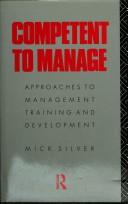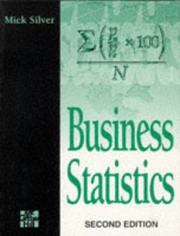| Listing 1 - 10 of 19 | << page >> |
Sort by
|
Book
ISBN: 1451916027 1462376975 145187166X 9786612842412 1282842412 1452717796 Year: 2009 Publisher: Washington, D.C. : International Monetary Fund,
Abstract | Keywords | Export | Availability | Bookmark
 Loading...
Loading...Choose an application
- Reference Manager
- EndNote
- RefWorks (Direct export to RefWorks)
Index number theory informs us that if data on matched prices and quantities are available, a superlative index number formula is best to aggregate heterogeneous items, and a unit value index to aggregate homogeneous ones. The formulas can give very different results. Neglected is the practical case of broadly comparable items. This paper provides a formal analysis as to why such formulas differ and proposes a solution to this index number problem.
Business & Economics --- Economic Theory --- Index numbers (Economics) --- Economic indicators. --- Business indicators --- Economic indicators --- Indicators, Business --- Indicators, Economic --- Leading indicators --- Numbers, Index --- Economic history --- Quality of life --- Economic forecasting --- Social indicators --- Economics --- Prices --- Indexation (Economics) --- Macroeconomics --- Index Numbers and Aggregation --- leading indicators --- Methodology for Collecting, Estimating, and Organizing Microeconomic Data --- Price Level --- Inflation --- Deflation --- Production, Pricing, and Market Structure --- Size Distribution of Firms --- Information and Product Quality --- Standardization and Compatibility --- Price indexes --- Export price indexes

ISBN: 0415037336 Year: 1991 Publisher: London Routledge
Abstract | Keywords | Export | Availability | Bookmark
 Loading...
Loading...Choose an application
- Reference Manager
- EndNote
- RefWorks (Direct export to RefWorks)
-Management Management --- Besoins (formation) Behoeften (opleiding) --- Grande-Bretagne Groot-Brittanië --- -Organization theory --- -Study and teaching --- Great Britain --- Executives --- Management --- Training of --- Study and teaching --- Organization theory --- Executives - Training of - Great Britain. --- Management - Study and teaching - Great Britain. --- Formation professionnelle Beroepsopleiding --- Management Management --- Parascolaire Opleiding buiten schoolverband --- Business executives --- Company officers --- Corporate officers --- Corporation executives --- Managers
Book
ISBN: 1462320511 1452739021 1282447874 1451911386 9786613821072 Year: 2007 Publisher: Washington, D.C. : International Monetary Fund,
Abstract | Keywords | Export | Availability | Bookmark
 Loading...
Loading...Choose an application
- Reference Manager
- EndNote
- RefWorks (Direct export to RefWorks)
Unit value export and import indices compiled from returns to customs authorities are often used as surrogates for price indices in the measurement of inflation transmission, terms of trade (effects), and to deflate import and export value series to derive volume series. Their widespread use is mainly due to their relatively low cost compared with establishment price surveys. This paper provides evidence of substantial bias in their representation of such price changes. Their continued use would mislead economic analysis. The paper considers the efficacy of alternative strategies for their improvement, and argues for a move to establishment-based price surveys.
Exports and Imports --- Macroeconomics --- Price Level --- Inflation --- Deflation --- Trade: General --- Empirical Studies of Trade --- International economics --- Price indexes --- Exports --- Imports --- Import price indexes --- Terms of trade --- Economic policy --- nternational cooperation --- Germany --- Price indexes. --- Terms of trade. --- Nternational cooperation
Book
ISBN: 1475512961 1475578563 Year: 2012 Publisher: Washington, D.C. : International Monetary Fund,
Abstract | Keywords | Export | Availability | Bookmark
 Loading...
Loading...Choose an application
- Reference Manager
- EndNote
- RefWorks (Direct export to RefWorks)
A key element in the build-up to the global recession and subsequently was the movement in house price indexes (HPIs). These indexes are particularly prone to methodological and coverage differences which can undermine both within-country and cross-country economic analysis. The paper outlines key measurement issues and reports on empirical work using an international panel data set that (i) considers whether differences in HPI measurement matter and, if so, in what way, and (ii) revisits the measurement of global house price inflation and the modeling of the determinants of house price inflation using HPIs corrected for differences in measurement practice.
Finance --- Business & Economics --- Financial Management & Planning --- Foreign Exchange --- Inflation --- Macroeconomics --- Time-Series Models --- Dynamic Quantile Regressions --- Dynamic Treatment Effect Models --- Diffusion Processes --- State Space Models --- Price Level --- Deflation --- Economywide Country Studies: Asia including Middle East --- Currency --- Foreign exchange --- Exchange rate pass-through --- Exchange rate adjustments --- Exchange rates --- Consumer price indexes --- Prices --- Price indexes --- Infrastructure --- Real Estate --- Index Numbers and Aggregation --- leading indicators --- Prices, Business Fluctuations, and Cycles: General (includes Measurement and Data) --- Housing Supply and Markets --- Economic Development: Urban, Rural, Regional, and Transportation Analysis --- Housing --- Property & real estate --- Housing prices --- House price indexes --- Asset prices --- National accounts --- Saving and investment --- Maldives --- United Kingdom --- Leading indicators
Book
ISBN: 1462376916 1455262773 1283565102 9786613877550 1455210455 Year: 2010 Publisher: Washington, D.C. : International Monetary Fund,
Abstract | Keywords | Export | Availability | Bookmark
 Loading...
Loading...Choose an application
- Reference Manager
- EndNote
- RefWorks (Direct export to RefWorks)
The IMF’s main uses of the International Comparison Program’s (ICP) estimates of purchasing power parity (PPP)-adjusted Gross Domestic Product (GDP) are as an element of the formula used to help guide decisions on its members’ quotas and in the World Economic Outlook (WEO). The paper outlines these uses and considers measurement issues particularly salient to IMF usage including: PPP imputations for member countries not participating in the ICP; PPP estimates for non-benchmark years; timeliness and periodicity of PPP estimates; economy groupings; and transparency. The paper was written as a chapter on ?IMF uses of PPPs? for the 2011 ICP Handbook.
Foreign exchange --- Purchasing power parity. --- Mathematical models. --- Law of one price --- One price, Law of --- Parity, Purchasing power --- Foreign Exchange --- Public Finance --- National Government Expenditures and Related Policies: Infrastructures --- Other Public Investment and Capital Stock --- National Government Expenditures and Related Policies: General --- Currency --- Public finance & taxation --- Purchasing power parity --- Public investment and public-private partnerships (PPP) --- Market exchange rates --- Exchange rates --- Expenditure --- Public-private sector cooperation --- Expenditures, Public --- United States
Book
ISBN: 1475555334 1475555296 Year: 2016 Publisher: Washington, D.C. : International Monetary Fund,
Abstract | Keywords | Export | Availability | Bookmark
 Loading...
Loading...Choose an application
- Reference Manager
- EndNote
- RefWorks (Direct export to RefWorks)
Hedonic regressions are used for property price index measurement to control for changes in the quality-mix of properties transacted. The paper consolidates the hedonic time dummy approach, characteristics approach, and imputation approaches. A practical hedonic methodology is proposed that (i) is weighted at a basic level; (ii) has a new (quasi-) superlative form and thus mitigates substitution bias; (iii) is suitable for sparse data in thin markets; and (iv) only requires the periodic estimation of hedonic regressions for reference periods and is not subject to the vagrancies of misspecification and estimation issues.
Housing --- Hedonic damages --- Inflation (Finance) --- Prices --- Mathematical models. --- Finance --- Natural rate of unemployment --- Loss of enjoyment of life damages --- Quality of life damages --- Damages --- Affordable housing --- Homes --- Houses --- Housing needs --- Residences --- Slum clearance --- Urban housing --- City planning --- Dwellings --- Human settlements --- Law and legislation --- Social aspects --- Investments: Metals --- Inflation --- Macroeconomics --- Real Estate --- Index Numbers and Aggregation --- leading indicators --- Prices, Business Fluctuations, and Cycles: General (includes Measurement and Data) --- Price Level --- Deflation --- Housing Supply and Markets --- Nonagricultural and Nonresidential Real Estate Markets --- Metals and Metal Products --- Cement --- Glass --- Ceramics --- Property & real estate --- Investment & securities --- Price indexes --- Land prices --- Consumer price indexes --- Silver --- Commodities --- United States --- Leading indicators

ISBN: 0077092252 9780077092252 Year: 1997 Publisher: Londres: McGraw-Hill,
Abstract | Keywords | Export | Availability | Bookmark
 Loading...
Loading...Choose an application
- Reference Manager
- EndNote
- RefWorks (Direct export to RefWorks)
Book
ISBN: 0077074459 Year: 1992 Publisher: London New York Madrid McGraw-Hill
Abstract | Keywords | Export | Availability | Bookmark
 Loading...
Loading...Choose an application
- Reference Manager
- EndNote
- RefWorks (Direct export to RefWorks)
Book
ISBN: 1451864345 1462305407 145198703X 9786613821881 1451985320 128253131X Year: 2006 Publisher: Washington, D.C. : International Monetary Fund,
Abstract | Keywords | Export | Availability | Bookmark
 Loading...
Loading...Choose an application
- Reference Manager
- EndNote
- RefWorks (Direct export to RefWorks)
The Consumer Price Index Manual (2004) provides guidelines for aggregation formulas that are promulgated at IMF training courses and technical assistance missions. This paper develops elementary level aggregation theory to better inform users and compilers. Most countries use either the Dutot or Jevons index formula. These formulas generally give different results; advice on choice of formula matters. Using an approach based on sample estimators, and an illustration based on scanner data, the paper shows how differences in these formulas can be explained by changes in price dispersion and, in turn, by product heterogeneity. Implications for choice of formula are considered.
Consumer price indexes. --- Electronic books. -- local. --- Price indexes. --- Business & Economics --- Economic Theory --- Price indices --- Consumer price index --- Cost of living indexes --- CPIs (Consumer price indexes) --- Retail price indexes --- Index numbers (Economics) --- Cost and standard of living --- Price indexes --- Macroeconomics --- Public Finance --- Demography --- Price Level --- Inflation --- Deflation --- Demographic Economics: General --- Labor Economics: General --- National Government Expenditures and Related Policies: General --- Population & demography --- Labour --- income economics --- Public finance & taxation --- Consumer price indexes --- Population and demographics --- Labor --- Expenditure --- Population --- Labor economics --- Expenditures, Public --- United Kingdom --- Income economics
Digital
Abstract | Keywords | Export | Availability | Bookmark
 Loading...
Loading...Choose an application
- Reference Manager
- EndNote
- RefWorks (Direct export to RefWorks)
| Listing 1 - 10 of 19 | << page >> |
Sort by
|

 Search
Search Feedback
Feedback About UniCat
About UniCat  Help
Help News
News